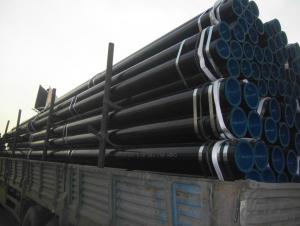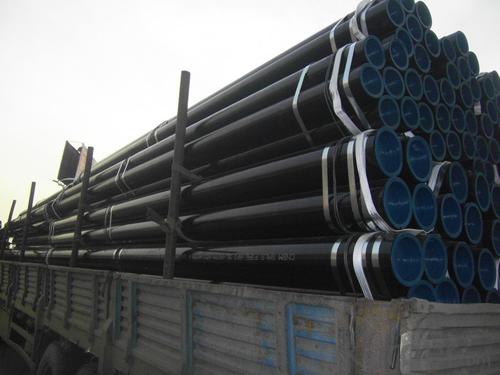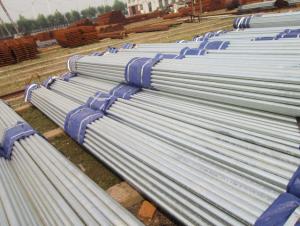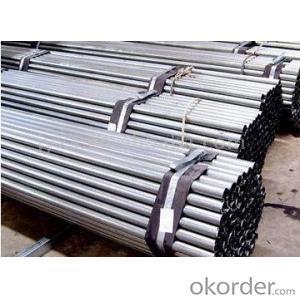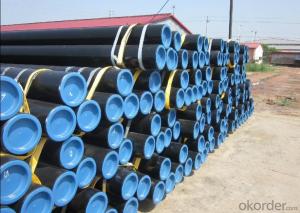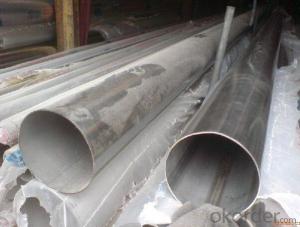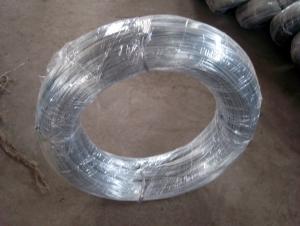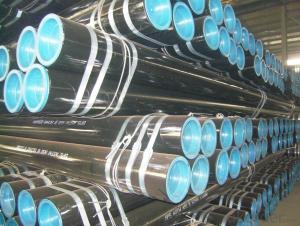SEAMLESS PIPE WITH BLACK PAINTING
- Loading Port:
- China Main Port
- Payment Terms:
- TT OR LC
- Min Order Qty:
- -
- Supply Capability:
- -
OKorder Service Pledge
OKorder Financial Service
You Might Also Like
Product Description
1. Commodity Name: Carbon Seamless steel pipe
2. Standard: API,GB,ASTM,ASME,DIN
3. Quality grade: 10#, 20#, A106B, A53B, API 5L B, Q235, Q345, ST37-2, ST 45, ST52.etc.
4. Dimension:
OD: 1/2"-24"
WT: 2.5-80mm, SCH10~SCH40~XXL
length: 5.8m,6m,8m,9m,12m
5. Technique: Hot Rolled/Cold Rolled/ Cold Drawn
6. application
carbon seamless steel pipes are widely used in gas, water and oil, transpotation;constructions;Bridge,highway,windows of model steel door; building materials;fences;heating facilities Fluid Pipe;conduit pipe,scaffolding pipe.etc.
7. Payment Terms: L/C D/A D/P T/T
8.packing and shipment
Packaged in bundles,as per customers' requirements, it can also bepackagesd as beveled ends, typed marking, black painting, plastic caps protection,woven bags packing
For 20" container the max length is 5.8m; For 40" container the max length is 12m. other options are available based on customer requests. Please discuss when placing orders.
- Q: What are the different types of steel coatings used for pipes?
- There are several types of steel coatings used for pipes, including epoxy, polyethylene, polypropylene, and fusion bonded epoxy (FBE) coatings. Each of these coatings provides different levels of corrosion resistance and protection, making them suitable for various applications and environmental conditions.
- Q: What are the different methods of repairing steel pipes?
- There are several methods to repair steel pipes, including welding, flange coupling, sleeve coupling, epoxy coating, and pipe lining.
- Q: Can steel pipes be used for geothermal heating systems?
- Yes, steel pipes can be used for geothermal heating systems. Steel pipes are commonly used in the construction of geothermal systems due to their durability, high heat transfer capabilities, and resistance to corrosion. They are capable of withstanding the high temperatures and pressure associated with geothermal heating systems, making them an ideal choice for transporting and distributing the geothermal fluid.
- Q: What does "HBB" glass steel pipe mean?
- Good water resistance, can be used for a long time in wet or water, and the ordinary composite is not water resistant, can only be used in dry environment.Heat resistance, fire resistance is superior to epoxy, glass fiber reinforced plastics and plastic and other materials. It can be used at 130 degrees for a long time, and not burned in case of fire.The utility model has the advantages of insulation, corrosion prevention, no rust, long service life, etc.. Generally up to 50 years, without maintenance.Simple and convenient installation and construction, because this product is light weight, high strength, laying construction method can properly solve the excavation due to road construction, exposed for a long time, prominent problems of city traffic, to achieve the excavation backfill pavement, buried at night, can normal traffic during the day.
- Q: What are the common standards and specifications for steel pipes?
- The common standards and specifications for steel pipes include ASTM A53, ASTM A106, API 5L, and ISO 3183. These standards outline the requirements for the manufacturing, dimensions, and mechanical properties of steel pipes used in various industries such as oil and gas, construction, and transportation. Additionally, specific applications may have their own standards and specifications that need to be met for quality and safety purposes.
- Q: Can steel pipes be used for transporting gases and liquids?
- Yes, steel pipes can be used for transporting gases and liquids. Steel pipes are known for their high strength, durability, and resistance to corrosion, making them an ideal choice for transporting various substances. Additionally, steel pipes have the ability to withstand high pressure and temperature, making them suitable for a wide range of applications in industries such as oil and gas, water supply, and chemical processing.
- Q: How do steel pipes compare to other pipe materials like PVC or copper?
- Steel pipes have distinct advantages over other pipe materials like PVC or copper. Firstly, steel pipes are extremely durable and can withstand high pressure and temperature, making them suitable for various industrial applications. They also have a longer lifespan compared to PVC or copper pipes, reducing the need for frequent replacements. Moreover, steel pipes are highly resistant to corrosion and chemical reactions, ensuring a consistent flow of water or other substances. However, steel pipes are generally more expensive and require skilled labor for installation. PVC pipes, on the other hand, are lightweight, cost-effective, and easier to install, but they may not be as durable or resistant to extreme conditions. Copper pipes are known for their excellent heat conductivity and resistance to fire, but they are more expensive and require more maintenance. Ultimately, the choice between steel, PVC, or copper pipes depends on the specific requirements of the project and the factors of cost, durability, and functionality.
- Q: What is the lifespan of steel pipes?
- The lifespan of steel pipes can vary depending on various factors such as the quality of the steel used, the environment in which they are installed, and the maintenance and care they receive. However, typically, steel pipes can last for several decades or even up to a century if properly installed and maintained.
- Q: How are steel pipes classified based on their thickness?
- Steel pipes can be classified based on their thickness into three main categories: Schedule, Nominal Pipe Size (NPS), and Wall Thickness. The Schedule classification is commonly used in North America and refers to the wall thickness of the pipe. It is denoted by numbers such as Schedule 10, Schedule 40, and Schedule 80, where the higher the number, the thicker the pipe. The Nominal Pipe Size (NPS) classification, on the other hand, is used internationally and refers to the inside diameter of the pipe. It is expressed in inches and is usually followed by a schedule number to indicate the wall thickness. For instance, NPS 6 Schedule 40 means a pipe with a 6-inch inside diameter and a wall thickness according to Schedule 40. Lastly, steel pipes can also be classified based on their wall thickness in millimeters or inches. This classification provides a more precise measurement of the pipe's thickness, usually referred to as the "wall thickness" or "wt" in specifications. The wall thickness is measured from the outside diameter to the inside diameter and can be expressed in various units of measurement, such as millimeters, inches, or gauge. In conclusion, steel pipes are classified based on their thickness using different systems such as Schedule, Nominal Pipe Size (NPS), and Wall Thickness. These classifications help ensure that the appropriate pipe is selected for specific applications, considering factors such as pressure requirements, structural integrity, and compatibility with other components of the system.
- Q: What are the standard dimensions and weight of steel pipes?
- The standard dimensions and weight of steel pipes vary depending on the specific type and grade of pipe. However, there are some common standard dimensions and weight ranges that are widely accepted in the industry. For seamless steel pipes, the standard dimensions typically range from 1/8 inch to 60 inch in outer diameter (OD) and from 10.3 mm to 914.4 mm in wall thickness. The weight of seamless steel pipes can vary from a few kilograms to several metric tons, depending on the size and length of the pipe. Similarly, for welded steel pipes, the standard dimensions range from 1/2 inch to 80 inch in OD and from 3.2 mm to 25.4 mm in wall thickness. The weight of welded steel pipes can also vary greatly, ranging from a few kilograms to several metric tons. It is important to note that the dimensions and weight of steel pipes can be customized based on specific project requirements. Additionally, different countries or regions may have their own standards and specifications for steel pipes, so it is always advisable to consult the relevant standards and guidelines when determining the dimensions and weight of steel pipes for a particular application.
Send your message to us
SEAMLESS PIPE WITH BLACK PAINTING
- Loading Port:
- China Main Port
- Payment Terms:
- TT OR LC
- Min Order Qty:
- -
- Supply Capability:
- -
OKorder Service Pledge
OKorder Financial Service
Similar products
Hot products
Hot Searches
Related keywords
